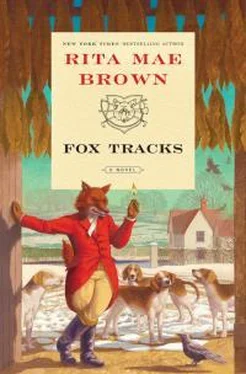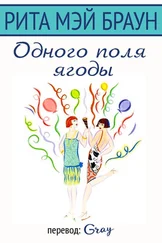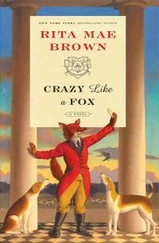A small black bear nestled up in its branches, looking down. Small though he was, if he chose to come down, one swat from his paw could break ribs or the neck of a hound.
Lafayette loathed the bear, but he behaved himself. Some of the other horses got nervous.
“Chicken,” the hound Dasher called up to the bear.
“I’m a bear, not a chicken,” the young fellow sensibly replied.
“All right, let’s go.” Shaker looked up. “For a fat little fellow, you can move.”
The fat little fellow clicked his jaws, a snapping sound that could be heard all the way back to Second Flight.
Sister looked down the creek west, then east. “If we follow the creek, there’s a decent crossing farther down. We’ll come out on the old farm road that leads up to the barns. Mmm, maybe a twenty-minute ride. Best to walk.”
Which they did. By the time they reached Old Paradise, the ground was dusted white like a sugar cookie. The snowflakes, small, could even be heard as they hit tree branches.
Everyone put up their horses. Betty, boots and socks off, old muck boots now on, had a big thermos of coffee. Sister had tea. Most everyone had something. The weather was worsening and, much as Jefferson Hunt relished an impromptu tailgate or even a planned one, this wasn’t the day.
Tariq Al McMillan, who rode out with the Custis Hall girls whose classes allowed them to hunt on a weekday, came up to Sister. “Thank you, master, and good evening.”
She always enjoyed hearing his lovely British accent. “Wonderful day,” said Sister. “Will I see you next hunt?”
“On Saturday. Thursdays I teach.” He tapped his crop on his hard hat, slightly bowed, then turned to leave.
“Did you ever hunt in the Shires, Tariq?” she called after him.
“I did. America is wilder.” He smiled, enhancing his handsome features. “At first, hunting outside of England was so different. I wasn’t altogether sure if I would like it. But now, of course, I can’t live without it.” He turned to join the students at the Custis Hall van, who were calling to him.
Once back at Roughneck Farm, Sister untacked Lafayette, wiped him down, put him in a stall with fresh warmish water, three flakes of alfalfa, and an orchard grass mix. She topped this off with a big kiss on the nose, which he endured.
Her other staff horses, Keepsake, Rickyroo, Aztec, and Matador, watched this from their own stalls.
“You’re such a suck up,” teased Keepsake, a nine-year-old Thoroughbred-quarter horse mix.
Lafayette then filled in all of them on the day’s hunt, which he knew would create waves of envy.
Up in the barn’s rafters, Bitsy, the screech owl, usually outside, fussed over her nest. She peered down, ruffled her feathers, wiggled her butt into her nest. It was going to be a long, cold night.
Knowing that, Sister checked everyone’s blankets, cleaned her tack in the heated tack room, then threw on her father’s old fleece-lined flight jacket from the Army Air Corps in World War II to trudge across the way to the kennels. Snow fell steadily.
On Saturdays and some Thursdays, Betty helped her with those chores, leaving her horse in Sister’s barn. But on Tuesdays, she and Bobby needed to hurry home and get back to business.
The kennels, added onto by Sister and her husband, Ray, back in 1964, beckoned Sister in the failing light. The white snow contrasted with the old paprika-colored brick. The back of the kennel quad was lined with huge trees inside a chain-link fence. The male and female dogs lived in separate large brick units, whereas the larger square center building housed the office, special runs for hounds being bred, as well as a more sequestered portion closed off inside with a metal door, a place for injured hounds to recuperate. Each of the hound quarters had a large outside run. But now no one was outside except Sister. When she pushed open the heavy wooden door, she spotted Shaker, bent over the desk, writing in his hunting journal.
“Everything locked down tight?” she asked.
“Yeah, before the details slip away, I just want to recount the hunt, who did what. Then I need to go home and throw some wood in the fireplace.”
“Me, too.” The wood-burning stove in her basement needed feeding twice a day.
Shaker lived in the tidy clapboard house perhaps fifty yards from the kennels. It was part of his huntsman’s contract. Sister kept everything in good order. If he needed a new refrigerator, she bought the best. Her father told her sixty years back when she was twelve, “If you have good help, keep them.”
Her daddy had sure kept his. His friends had chided him for paying his help too much, but Peter Oberbeck had men who worked for him all their lives. He missed them when they retired or died. Of course, they turned out full force when his time came, a tribute to a good man. This respect for good people had been passed on to Sister. She didn’t judge people on how much money they had, or who they knew. She judged them on what they did. Were they competent, hardworking? Were they as good as their word? And like everyone who came into her life, whether staff or friend, her ultimate criteria was, “Do they have a good heart?”
Someone with a very good heart drove slowly by the kennels in a Land Cruiser.
Shaker grinned. “Your boyfriend is here.”
“Need a hand with anything? He can wait.”
“No, everyone’s fine. Hojo’s wearing his new blanket. He’s out in his pasture and I’ll put him up in the barn in a minute.” He glanced out the window, flakes falling hard and fast. “Looks like this is going to stick around.”
“We need it. It’s been an oddly mild winter. Well, if you don’t need anything else, I’ll go up home.”
When she walked through the back door, Raleigh, her Doberman and Rooster, the harrier, a beautiful tricolor hound that resembled a small foxhound, rushed to greet her.
Naturally, Golliwog, the cat, made Sister come to her.
In the kitchen, Gray gave Sister a big kiss.
“What a hunt,” she exclaimed. “I wish you’d been with us.” She unfastened her titanium stock pin and began untying the tie.
“Me, too, but I promised Garvey Stokes I’d meet with him. He’s a smart fellow, really.” He noticed the pin. “Next time I see Garvey I’ll tell him you always use the special pin he made for you.” Gray paused. “I saw Felicity, too. She looks good and is a smart one, too.”
“That she is.”
Felicity Porter, Tootie and Val’s classmate, worked for Garvey while she and Howie, her husband, lived in a dependency on Crawford’s estate. She took college classes at night and soaked up everything she could about Garvey’s metal business.
Gray walked over and sat at the table, opening the New York Times , which he’d brought home. “Look,” he said a few moments later, pointing at an article found on one of the back pages.
Sister read the column, read it again, then looked at him. “What in the hell is going on?”
“That’s exactly what happened on Madison Avenue,” Gray said, clearly perplexed.
The owner of an exclusive tobacco shop in Boston had been murdered. Just like Adolfo Galdos, a pack of American Smokes had been left on his chest.
CHAPTER 7
“Away of life swept away,” Sister mused as she read from her computer screen, an activity they only had time for in the evening. “Nationalizing an industry is never as good as letting those who know how to run it do their job. Here, look at this.”
Fretting over a crossword puzzle, Gray sighed and put down the paper to sit next to her at the desk. He’d learned long ago when Sister took a notion to go with it. “What is it you’re looking at?” he asked.
Filling the right side of the screen was a grainy sepia photo of acres upon acres of mature tobacco plants.
Читать дальше












